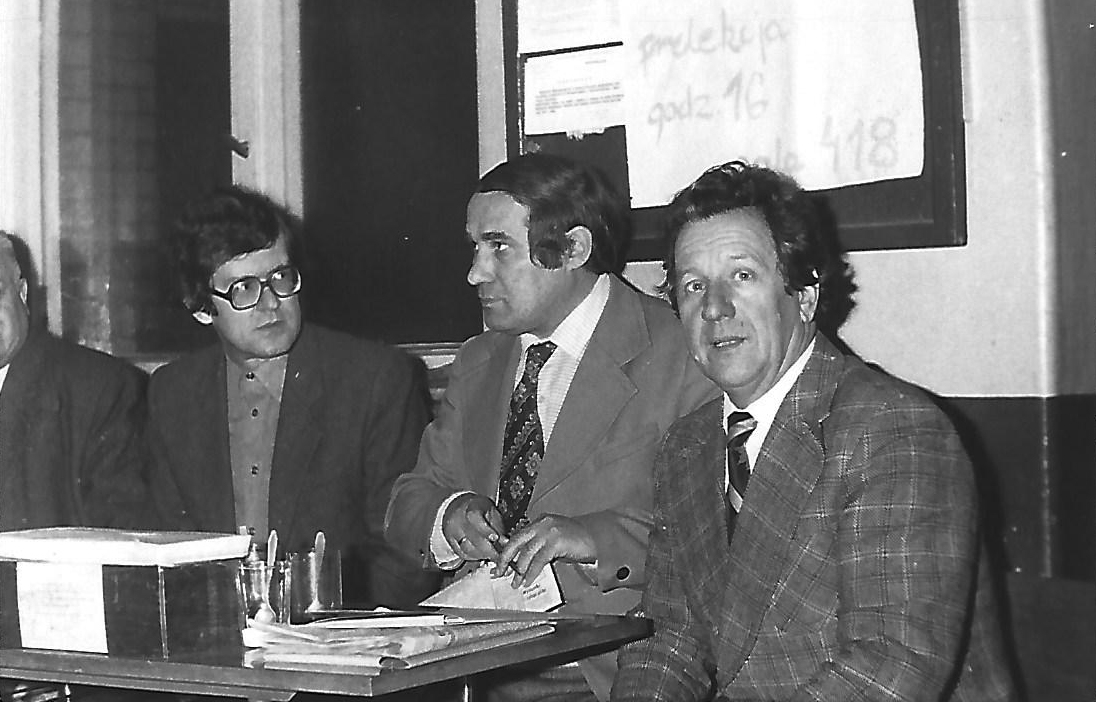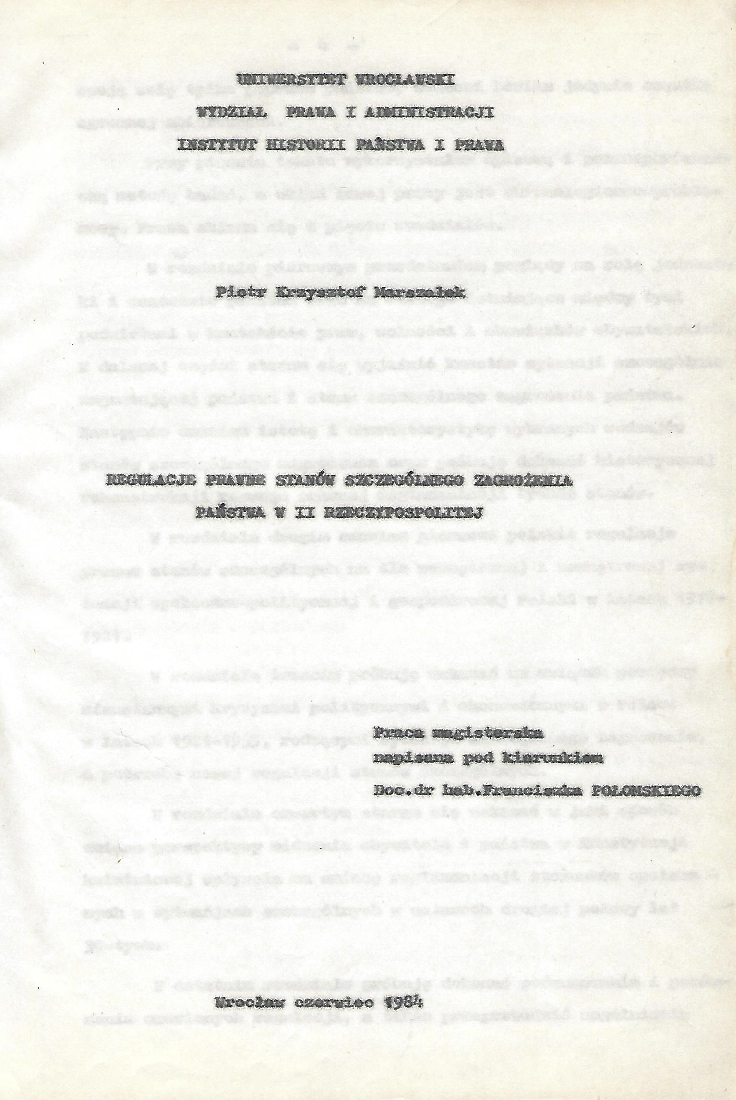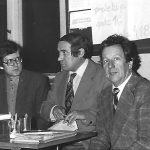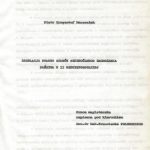
Bierut – the removal of our University’s patron
The 6th of June, 2024 – that day, 35 years ago, the photo of Bolesław Bierut was removed from our Alma Mater’s signboard. On the 5th of June, 2024, 35 “Wrocławska Wolność” badges of honour were awarded to people, who were members of the University of Wrocław community (students and personnel) during the communist dictatorship before 1989 and fought for the values, amongst others, freedom, truth, justice and human dignity.
A photo report covering the ceremony of the third edition of “Wrocławska Wolność” https://uwr.edu.pl/lista-odznaczonych-wroclawska-wolnoscia-w-edycji-2024 will soon be available on our website.
But today we present the article by prof. Piotr Krzysztof Marszałek, who brought the story of the removal of Bierut from the University’s name to the attendees of the 5th of June ceremony.
Author: Piotr Krzysztof Marszałek
The knowledge of the story of the University of Wrocław’s patron removal is not widespread. Moreover, it is commonly misstated. Therefore, I decided to bring that story closer to our University’s community.
One of the reasons behind my decision was one of the electoral University Electoral College March meeting. One of the candidates for the Rector said that prof. Mieczysław Klimowicz himself led to the change of the name of the University of Wrocław. Professor Klimowicz, without a doubt, was a prominent literature researcher, and a Rector between 1987-1990. However, his actions did not cause the removal of Bierut’s patronage over our university. What really happened then?
Bolesław Bierut was responsible for the Stalinization of Poland and multiple communist crimes. He was enforced as a patron on our university by the Resolution of the Council of Ministers No. 291 dated 12 April 1952. It was meant to be a way to celebrate Bierut’s 60th birthday which were to be in six days time. It was not a one-time crime against our academic community. Three days after the resolution was passed, the then Senate of the University was forced to send a “request” to Bierut for permission to give the already established name. This is, what it says in that document: “Expressing the fervent wishes of the academics and the youth studying, the Senate of the University of Wrocław decided, at a solemn meeting on 15 April 1952, to address You, Distinguished Citizen President, with a great and heartfelt request for permission to name our University after You.”
As if this was not already too much, at their next meeting, on 18 April, the senators had to write a “Letter of Gratitude” for an approval of the name-giving from the “Father of the Nation.”
It was very typical of those times – a will for the action caused by the cult for a person.
It is noteworthy, that Bierut did not even deign to meet with the university community delegation (joined by a then Rector prof. Jan Mydlarski himself) which went to Warsaw with the “request.”
The university community never came to peace with the arbitrary decision of the government. The two aforementioned documents belong to the infamous side of our university’s legacy. They certainly stand in contrast with the autonomy of the academic institution. Here, it is worth quoting Rector Mydlarski’s own words, which he delivered during a conference at the Ministry of Higher Education attended by the ministry’s deputy minister, Eugenia Krassowska-Jodłowska, on 29 January 1952 in Warsaw: “University of Wrocław shall be given special care by the Government…”. I believe, having in mind the enforced patronage, it was not the care the Rector thought of.
When society insisted on its individual rights in 1980-1981, the university community took steps to remove the dubious patron. At the beginning of the new academic year 1981/1982, a group of academics from the Faculty of Law and Administration (prof. Karol Jońca, doc. Stefan Kaleta, prof. Alfred Klein, prof. Jan Kosik, doc. Jan Selwa, and dr Janusz Wyrwisz) handed in a memorandum to the Rector prof. Józef Łukaszewicz, in which they demanded that “in order to protect the dignity of education, respect for its employees and students of many generations, it is fair to restore our University to its name from before the change on 18 April 1952,” stressing that the enforced patron “present himself as a burden and does not withstand the moral test.” Similar in content were the resolutions passed by the Councils of the Faculties of Philosophy and History, Mathematics, Physics, and Chemistry. The latter included an appeal to university senators to pass a resolution to use only “Uniwersytet Wrocławski” [“University of Wrocław”] until a new name was agreed.
The matter of the change of the university’s name was placed on the agenda of the Senate on 18 November 1981. The signatories of the above-mentioned memorandum and dr Adolf Juzwenko, the later long-serving director of the Ossoliński National Institute in Wrocław, were invited to this meeting. During the debate on this item, Rector Prof. Lukaszewicz reported that the issue of the unwanted patron was a matter of great concern to the university community and that he had been receiving statements and letters from both University personnel and people outside this group. At the same time, he stressed the agreement of views that the patron should be removed. He also mentioned proposals for new patrons that should be considered, although the dominant opinion was to return to the name “Uniwersytet Wrocławski” [“University of Wrocław”].
A few suggestions are worth noting here. These included a suggestion that, following the example of the Ossoliński National Institute in Wrocław, which was re-established in Lwów, the Alma Mater should be named after one of the universities of Lwów or Vilnius, as scholars from both these universities had built the post-war University of Wrocław. Bolesław Chrobry (Bolesław I the Brave) was also mentioned as a candidate for a patronage. There were also references to the traditions of the 19th-century Slavonic Literary Society [Towarzystwo Literacko-Słowiańskie] active in Wrocław. During the discussion, only prof. Władysław Zamkowski from the Faculty of Law and Administration had doubts as to whether the initiative to change the name was not perhaps premature and simply conjunctural-political in nature.
In the end, the senators agreed with the conclusions formulated by prof. Franciszek Polomski, then Vice-Rector for General Affairs. The importance of changing the name of the university was acknowledged as urgent. It was decided to consult the university community on the issue by holding a university-wide referendum, the results of which were to be published by 20 December 1981. Therefore, a three-person committee was formed to organise the referendum. The head of the committee was pro.f Kosik; one of the members was dr Juzwenko. Third place in the committee was reserved for the candidate representing students and chosen by the university youth organizations. Piotr Krzysztof Marszałek, a then law student and a member of the Democratic Youth Organization, was chosen.
The Rector Łukaszewicz, following the implementation of the passed resolutions, informed the university’s academic community of the decisions taken by means of a proclamation on 20 November, and on the same day issued an order specifying the principles of organisation, and the manner in which the referendum would be conducted. All activities were to be finished by 30 November.
The late autumn of 1981 was a time of huge social tensions. The authorities tightened and hardened their actions further and further, society radicalised its attitudes demanding further reforms to democratise public life. The processes have not passed by the academic community. A breach of democratic procedures in the election of a new rector at the Radom University of Engineering has sparked a strike by university staff and students. Supportive strikes soon began at many universities in the country. Most often these took the form of occupational strikes. A similar one also broke out at the University of Wrocław, paralysing the functioning of the university. In these circumstances, the Rector, implementing the resolutions of the Senate, ordered a referendum to be held on changing the name of the University. It took place between 1-9 December. 12068 staff and students were eligible to vote. The referendum voter had to answer one of three questions: 1. Are you in favour of keeping the name “Uniwersytet Wrocławski im. Bolesława Bieruta” [“Bierut’s University of Wrocław”], 2. Are you in favour of bringing back the name “Uniwersytet Wrocławski” [“University of Wrocław”], 3. Are you in favour of finding a new patron for the University of Wrocław.
Despite the lack of any referendum campaign, 6970 eligible voters, or 58% of those eligible, took part in the referendum. A significant number of students did not take part in the referendum, as the occupational strikes and the considerable number of suspended classes kept many of them at home. In contrast, it should be noted that a strong identification with the university was demonstrated by the personnel of the holiday resort in Karpacz, who cast their votes in a collective manner.
The result of the vote was as follows: 527 votes were in favour of Question 1, 3872 votes were in favour of Question 2 and 2468 votes were in favour of Question 3. Considering the atmosphere, such a result was predictable. The referendum committee, with the participation of the pro-Rector prof. Połomski, met in prof. Kosik’s office at the Faculty of Law and Administration on 15 December 1981. Dr Juzwenko, who was arrested on the night of martial law, did not take part in the meeting.
The report of the Special Committee on the Name of the University was reviewed by university’s Senate at its meeting on 16 December 1981, already during martial law. At that time, evaluations of the reports of the scrutiny committees set up in all faculties were presented. Doc Kaleta, head of the Scrutiny Committee at the Faculty of Law and Administration, provided extensive assistance in the work of the Committee. A draft resolution prepared by the Commission of the Senate proposing the restoration of the name “Uniwersytet Wrocławski” [“University of Wrocław”] was also presented. During the meeting, the senators were informed in detail about the results of the referendum and, in prof. Kosik’s opinion, there were grounds for the Senate to request the Council of Ministers, by means of an adequate resolution, to repeal the 1952 Resolution imposing a patron on the University. Rector prof. Łukaszewicz informed the audience that he had been constantly receiving correspondence in support of the idea of changing the University’s name, for which he quoted a letter dated 3 December 1981 from the employees of the Visual Arts Studio in Wrocław, which showed that the issue went far beyond the academic community.
The resolution passed, by secret ballot, with extensive justification states among other things:
The university’s name is its personal asset; it is a mark of its traditions, structure and operations, the sciences and skills practised. It has its place in national culture. In country and in the world, among academics, studies dedicated youth, in society; it represents the meaning and intellectual (and other) values. Its moral value is huge.
as well as
The alive patron was enforced on the University of Wrocław in 1952 in a so-called “a cult for a person” period, followed by the change of the name, which resulted in a moral injury. In the belief that in the process of socialist renewal it is decent to repair this damage, the Senate of the University of Wrocław, at its meeting of 16 December 1981, passes a petition to the Council of Ministers to repeal the Resolution of the Council of Ministers No. 291 dated 12 April 1952.
and in justification
The name “UNIWERSYTET WROCŁAWSKI” [“UNIVERSITY OF WROCŁAW”] without addition has its permanent place in academic life, in society, the university serves for, in hearts and thoughts of all those who gave themselves over to science and truth.
In implementation of this resolution, Rector Łukaszewicz sent an appropriate letter on 22 December 1981 to Mieczysław Kazimierczuk, then head of the Ministry of Science, Higher Education and Technology. The reply came surprisingly quickly, at the beginning of January 1982. However, it was not from the head of the Ministry, but from the Undersecretary of State responsible for the financing of higher education, Jerzy Sablik, who notified that “the Ministry does not share the University’s position on the change of its name and, therefore, I am not going to give the application any further process.”
This laconic response illustrates the disregard with which the authorities of the time treated the demands of the public and saw no need to justify their decisions. It should be noted that the time of martial law and the social malaise that followed were not helpful for the continuation of such initiatives.
The issue of the removal of the University’s patron was unexpectedly revived in 1988. During a meeting of the Senate held on 2 March, a discussion developed around the 20th anniversary of the events of March 1968, when prof. Wojciech Wrzesiński, from the Faculty of History and Philosophy, put forward a motion to restore the University’s original name. This view was supported by doc. Stefan Kaleta from the Faculty of Law and Administration, who requested a renewal of the Senate’s resolution of 16 December 1981. The submitted proposals were supported by prof. Wacław Korta, a prominent historian, who quoted statements from the new editions of history textbooks for secondary schools, emphasising the negative assessment of Bierut’s achievements. However, no decision was taken at the time. This is because they did not want to link the issue of the name change with the anniversary of the March events. This did not occur until the Senate meeting on 29 June 1988.
As part of routine announcements, the then Rector prof. Mieczysław Klimowicz informed the senators that two days earlier he had met with prof. Marian Orzechowski, former Rector of the University of Wrocław and at the time a member of the Political Bureau of the Central Committee of the Polish United Workers’ Party, responsible for higher education matters, and had discussed the university’s current problems, including the issue of the name change. During that conversation, a declaration was to be made, from an influential person belonging to the circle of power at the time, of support for the university community’s efforts to change the name. Within the framework of the same announcements, prof. Wrzesiński considered it appropriate for the Senate to take a strong stance and presented a draft resolution to this effect. In response, Rector Klimowicz felt that the importance of the matter required that it should not be discussed as part of the announcements, but as an additional point on the agenda of the session. And so prof. Wrzesiński read out the draft resolution that had been prepared. In a brief discussion, prof. Bronisław Pasierb, from the newly established Faculty of Social Sciences, pointed out that we were already belated in the de-Stalinisation process even in relation to the USSR. In his opinion, a name change would “provide compensation and bring satisfaction to the academic community.”
The unanimously passed resolution said:
The Senate of the Bierut University of Wrocław, meeting on 29 June 1988, reiterates its resolution, passed on 16 December 1981, to restore the former name: U n i w e r s y t e t W r o c ł a w s k i [U n i v e r s i t y o f W r o c ł a w].
The Senate of the University of Wrocław requests His Magnificence prof. dr Mieczysław Klimowicz to re-establish the legal procedure of the resolution of 16 December 1981, as defined by the current legal regulations for the naming of a university.
The holiday period was not ideal for undertaking intensive activities. Especially as a wave of public dissatisfaction has been rising again in the country since the end of April. Initially, the authorities tried to stifle public protests in their usual way. However, the following months brought an increase in strike action. It was not spoken out loud, but evaluations by the Ministry of the Interior were increasingly indicating “an uncontrolled social explosion with difficult-to-predict economic and political consequences.”
These analyses reached power circles, making them listen more and more to public demands. This atmosphere had also encouraged increased efforts to change the name of the University. These efforts were joined by prof. Kazimierz Orzechowski, long-serving head of the Institute for the History of State and Law and, at the time, also a member of the Sejm [lower house of the Polish Parliament], associated with Unia Chrześcijańsko-Społeczna [the Christian Social Union]. He reported that on 9 November 1988 he had spoken to prof. Bogusław Kędzia, then head of the Faculty of Science, Education and Scientific and Technological Progress of the Central Committee of the Polish United Workers’ Party [PZPR], who informed him that the position of the Faculty regarding the removal of the University’s patron name was positive and the corresponding letter had already been sent to the Ministry of National Education. He also informed that the issue would not be addressed before 15 December, the day of the anniversary events marking the 40th anniversary of the reunification of the labour movement. However, he declared that the change would be implemented during the winter term of the ongoing academic year, and the legal services of the Office of the Council of Ministers are already exploring procedural ways. Prof. Orzechowski also informed the Rector about the possibility of a meeting with the Minister of National Education, prof. Jacek Fisiak, who was to be in Wrocław on 15 November.
We don’t know if the meeting happened. Nevertheless, the issue of changing the name of the University only gained momentum in May 1989. At a cabinet meeting on 11 May, a draft of a relevant law was passed, rather laconic as it contained only two articles. First of which stated: Bierut’s University of Wrocław is renamed to “Uniwersytet Wrocławski” [“University of Wrocław”] In the attachment it is said:
The changes taking place in the social and political life of our country have led to a discussion on the appropriateness of keeping the current name of the University of Wrocław.
The facts revealed to the public about the university’s patron’s activities and character provoked strong opposition from the academic community, which, emphasising the university’s educational purposes and objectives, requested the change of the name.
The Senate of the Bierut University of Wrocław, meeting on 29 June 1988, reiterates its resolution, passed on 16 December 1981, to restore the former name:
The Main Council of Science and Higher Education positively evaluated this change. It was also approved by numerous academics during their speeches concerned with that topic.
After reading this justification, it is difficult not to notice a fundamental change in the Communist authorities’ view of the University’s patronage. It went fast from then. On 17th of May, the project of the Act went to the parliamentary committees for Legislative Work and National Education and Youth. The committees addressed the submitted draft the very next day. The draft was passed as submitted by the government. In the Committee on National Education and Youth, MP Anna Staruch from the Polish United Workers’ Party was appointed rapporteur. The committees prepared a report that included only one sentence: “The High Sejm shall deign to pass the Act without any amendments.” The report was the subject of a plenary session of the Sejm on 29 May, under point 8 of the agenda. It should be noted that MPs expressed no interest in participating in the discussion. However, eight voted against the change, and 22 abstained. The enacted Act was published in the Journal of Laws No. 34, Entry 184 dated 6 June 1989, and became effective on that date, meaning that the patron of the University was removed on that date.
In fact, the patron had started to be removed from the University much earlier and using different methods. When the need arose to renew the signboard on the University facility, the new patron was no longer there. Students did not include the patron in the title pages of their theses under the name of the university, and crossed out the printed name of the patron in their indexes.
The facts cited above demonstrate that the entire university community, both academic and non-academic groups, contributed to the removal of the patron imposed on the University. The role of those who held public positions of authority at the time was arguably unremarkable but nevertheless not determinative.
Many years ago, an extensive chapter thoroughly analysing the entire process of name acquisition, loss and restoration of the University of Wrocław was published by prof. Kosik in his work Studia nad przeszłością i dniem dzisiejszym Uniwersytetu Wrocławskiego [Study on past and present day of the University of Wrocław], edited by W. Wrzesiński. I invite anyone interested in the history of our Alma Mater to read this chapter.
Translated by Michał Bogucki (student of English Studies at the University of Wrocław) as part of the translation practice.







